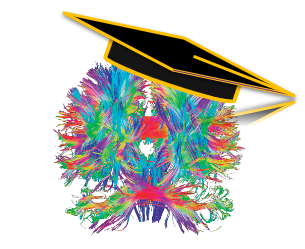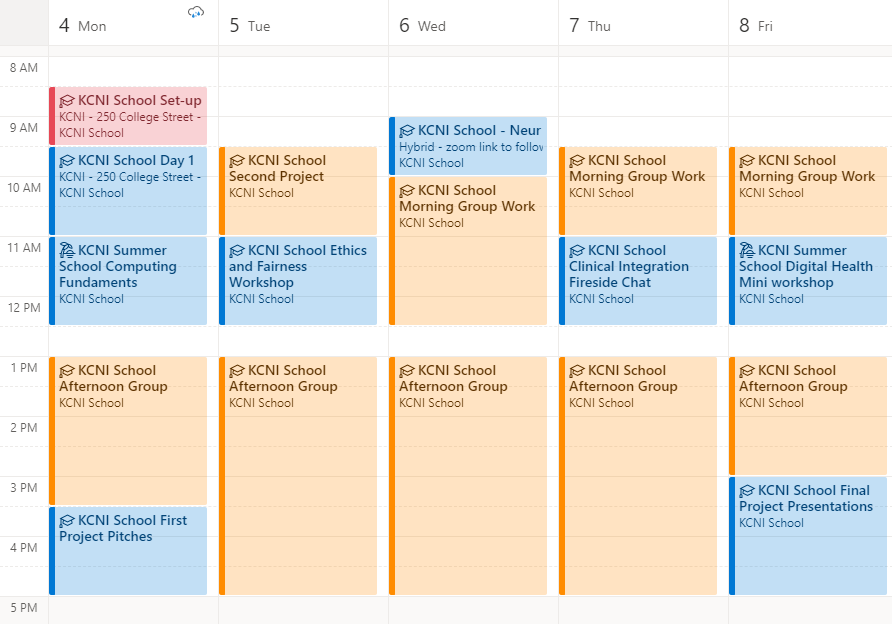- Created by Erin Dickie, last updated by Unknown User (frank_mazza) on Jul 04, 2022 3 minute read
The Krembil Centre for Neuroinformatics is excited to offer a five-day intensive project-based learning week where trainees will learn hands-on techniques for integrating multi-scale neuroscience data. This course is designed to introduce participants to the concepts and methods behind psychiatric neuroinformatics - encompassing genetics, brain structure and function, and cognition. In addition, participants will uncover the links between modalities of human genomics, neuronal electrophysiology, structural and functional neuroimaging, and observed behaviour that KCNI scientists are integrating through a series of virtual modules and a group-based project using real-world data types to study mental illness.
This unique learning opportunity will prepare participants to handle and analyze multiple data types in hopes that their own research may benefit from collaborative, multi-modal approaches. Critically, participants will also learn about best practices for data management and quality control in the context of integrative analysis.

Schedule for the Week

Project Ideas Themes
Project 1 - Genomics
Using Tractor for ancestry-specific GWAS in admixed populations.
Tutorial link: https://github.com/milicmil/KCNI_summer_school_tractor_gwas
How do we analyze admixed individuals in the context of genome-wide association and how do we explore/visualize the results?
Genomics TAs: Emily Wiljer, Mu Yang, Earvin Tio
Project 2 - Single Cell Transcriptomics
Integrative analysis of mouse and human single-cell gene expression data. What are conserved cell types in the brain and what are their characteristics?
What’s this project about?
Main idea: perform integrative analysis of mouse and human (and possibly other species, including macaques and marmosets) neocortical cell types according to transcriptomics and possibly intrinsic electrophysiology. These analyses will directly feed into cell and circuit models of mouse and human circuits, led by Etay’s group.
Key questions:
- Can we identify orthologous cell types between species?
- What genes / features distinguish cell types?
- Are there aspects of these features that seem relevant to computational processing of cells and circuits?
- What characteristics of these features can be modelled in the context of cell and circuit models?
What (dataset) resources are available to help answer this question? Allen Institute for Brain Sciences Cell Types database https://celltypes.brain-map.org/
Link to GitHub: https://github.com/sonnyc247/KCNISS_2022_Week2
Transcriptomics TAs: Sonny Chen, Mel Davie
Project 3 - Simulating Ketamine Effects on Cortical Neuronal Networks and EEG
The project will simulate spiking activity in simplified neuronal networks in health, depression, and depression + ketamine conditions. The simulated activity will reproduce baseline and response firing rates, as well as EEG in a network of simplified neurons belonging to key types in the cortex. The project will model the effect of ketamine on specific neuronal mechanisms and neuron types in the network.
Pre-requisite learning and installation guide found on github: https://github.com/FrankMazza/Microcircuit-Modelling-2022.git
TAs: Alex Guet-McCreight & Frank Mazza
Project 4 - fMRI based Whole Brain Modeling
Using computational network models of neuroimaging data to identify physiological mechanisms and signatures of mental illness
The project will apply connectome-based whole-brain modelling to study meso- and network-level mechanisms underlying brain connectivity patterns in functional MRI data. The specific focus is on brain signatures of sleep deprivation, which has well-understood relationships to a wide variety of clinical conditions across both psychiatry (e.g. depression, schizophrenia) and neurology (e.g. alzheimers, parkinsons). This research area is prosecuted jointly by KCNI groups - whole-brain modelling (Griffiths lab) and cognitive network modelling (Diaconescu lab), and this project is a collaboration between these.
Whole Brain TAs : Shreyas Harita, Davide Momi, Sorenza Bastiaens
CogNeMo TAs: Zheng Wang, Milad Soltanzadeh, Daniel Wurgaft
Github links:
https://github.com/GriffithsLab/kcnischool2022-projectweek (info, materials, kanban scrum project management)
( see also https://github.com/krembilneuroinformatics/openneuro_preproc )
Pre-requiste Learning Materials
Get Pre-requisite learning material from the KCNI School Virtual Learning Series
- No labels